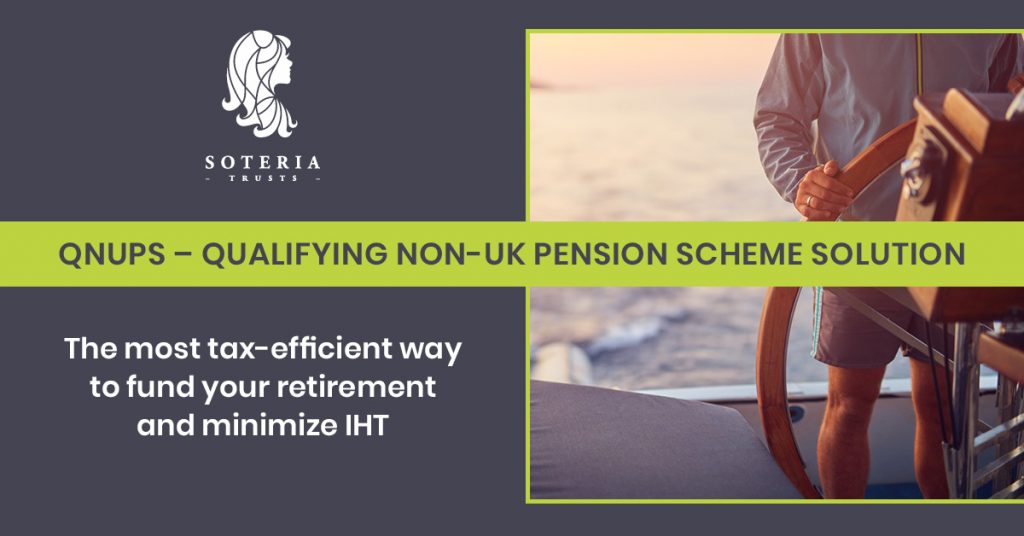Domicile and IHT Planning

Please be advised that the information in this article regarding QNUPS and IHT is no longer accurate due to the recent changes announced in the UK Budget. Starting in April 2025, the regulations will have significant implications that may affect your understanding of these topics. We encourage you to stay informed and consult with a Soteria Trusts expert to navigate these changes effectively.
Taxation rules around expatriates’ worldwide assets can sometimes be confusing. Being unaware of the tax implications of your domicile status, especially as a UK national and a foreign national with UK-sited assets, can cost you high tax rates. Not acting on that can lead to your family or beneficiaries suddenly having to pay large sums of money in the form of Inheritance Tax (IHT). One thing that UK expats, or anyone with UK assets, should consider is their domicile in IHT planning.
How would your country of domicile tax authority know about the assets you own in foreign jurisdictions? Whilst it may be nice to think this was perhaps the case and that even the assets you owned abroad would not be taxed, in fact, there are a number of ways in which different authorities tie up loose ends.
When you pass away outside your passport country, the authorities where you die will report your death to your embassy. The embassy will subsequently notify all the relevant authorities and departments in your country of origin of your death; thus, the tax office will be aware of this.
Probate
Tax authorities in your country of domicile will then order the court of probate to investigate. Probate is an authority given to the executors of your estate to administrate and deal with your estate, distributing the assets in accordance with your wishes and complying with other requests you may have specified in your Will. So, a court will be approached in your domicile country and probate requested. The grant of probate will usually be held pending the issue of grants of probate in other countries. In this way, your country of origin authorities will glean details about your estate and ensure that the tax authority is advised so that IHT can be dealt with.
Related: Free Will Review
Probate in the UK – IHT charged on worldwide assets
The British expat’s estate is usually burdened with a relatively high level of IHT. Tax is payable on the entire value of the worldwide estate. There is a nil rate band, meaning that tax is levied at 0% on the first £325,000 per person or £650,000 for a couple upon death. However, all asset values above that are taxed at a flat rate of 40%.
If you consider the fact that IHT will be assessable on your worldwide assets at death, it often comes as quite a shock to many British expats that they will leave a great deal less to their heirs than they had envisaged. However, note that any assets within the UK will be assessable whether you are domiciled there.
How do I minimise IHT exposure as an expat?
Probably the best thing you can do is create a succession plan to minimise your assessable estate assets, diminishing the IHT burden or negating it. In this respect, there are a number of things you can do.
Make a Will
If you have also neglected to plan properly and maybe have some assets in a jurisdiction without a Will, there could be some severe delays in your heirs receiving any benefits. One unfortunate widow took three years to access her husband’s estate because there were jurisdictions that a Will did not cover, and other jurisdictions became reluctant to issue grants of probate. Apart from grieving for her lost husband, she was faced with ongoing living expenses and no source of income until the probate situation was resolved and all IHT had been settled.

Change your domicile
This can be achieved, but to do so in a satisfactory manner can be relatively expensive. An action list would need to be completed to ensure that you have complied with the rules associated with the country you are changing from. Then, demonstrable facts about your new domicile will need to be established and documented in an affidavit, which would need to be sworn by a respected legal counsel in your country of origin.
Can I change my UK domicile?
IHT is a complex matter requiring careful planning and action to ensure you do the right thing. For many, it is a well worthwhile exercise to consider and then process. Some expats think that by changing their country of residence, they are automatically non-domiciled in the UK; however, for that to happen, one must live outside the UK for at least six years in one jurisdiction. Moreover, there is an additional rule that not many people know about:
Once you establish a domicile of choice in a specific country and then you move your residence to another country, the six-year rule applies to your next country of residence from scratch.
Rewrite ownership of your foreign property
For those who have a house outside of your home country, and it is owned by your spouse, this specific asset is outside your estate as you actually do not legally own it. Thus, this asset would not be included in the assets for calculating IHT.
Set up a Trust
Use facilities open to you, such as trusts, to ensure that you do not legally own your assets. Your estate assets, such as property, insurance policies, cash, investments, etc., can comfortably be written or settled into trusts. Once assets are settled into a trust, you no longer legally own them; therefore, they are outside the IHT net for IHT purposes as far as your estate is concerned. Of course, depending on the jurisdiction of your domicile, specific rules must be followed to operate trusts legally. You may have a problem making a successful plan for countries that do not recognise trusts.
Related: Advantages of setting up a Trust in Hong Kong

Trusts to help settle family disputes
Setting up a Trust would not only help you deal with the IHT, but you could also deal with potential ongoing family disputes after your death. For example, if your spouse’s family were to put pressure on you to release assets to them, a trustee could refuse. In your letter of wishes to the trustees, advising them of your desires after your passing, you could specify that your spouse was only to benefit from an income rather than a distribution of assets. This would protect your spouse from any unwanted predators, even if they included undesirables from within the extended family.
A trust could also deal with grandchildren and beyond. Whilst a trust legally takes ownership of your assets from your hands, it is subject to a letter of wishes and will be administered professionally and legally by whomever you appoint as the trustees. These days, trusts come in packaged deals, and they are run by professional trustees, negating any unnecessary anxiety for you.
Related: Are Trusts Safe?
Next steps
In any event, you are wise to seek advice from a professional who can oversee your entire situation and give you the appropriate advice about a succession plan, IHT planning, trusts, wealth management, investments, retirement planning and any other matters relating to the business of living life.
Make an appointment today and get a free financial health check so that you are aware of the pitfalls you may face in any aspect of your financial future.
This article has been written by Andrew Wood, Managing Director of Business Class UK – the sole distributor of Soteria Trusts services in the United Kingdom.
Connect with him on LinkedIn: https://www.linkedin.com/in/andrewwoodbca